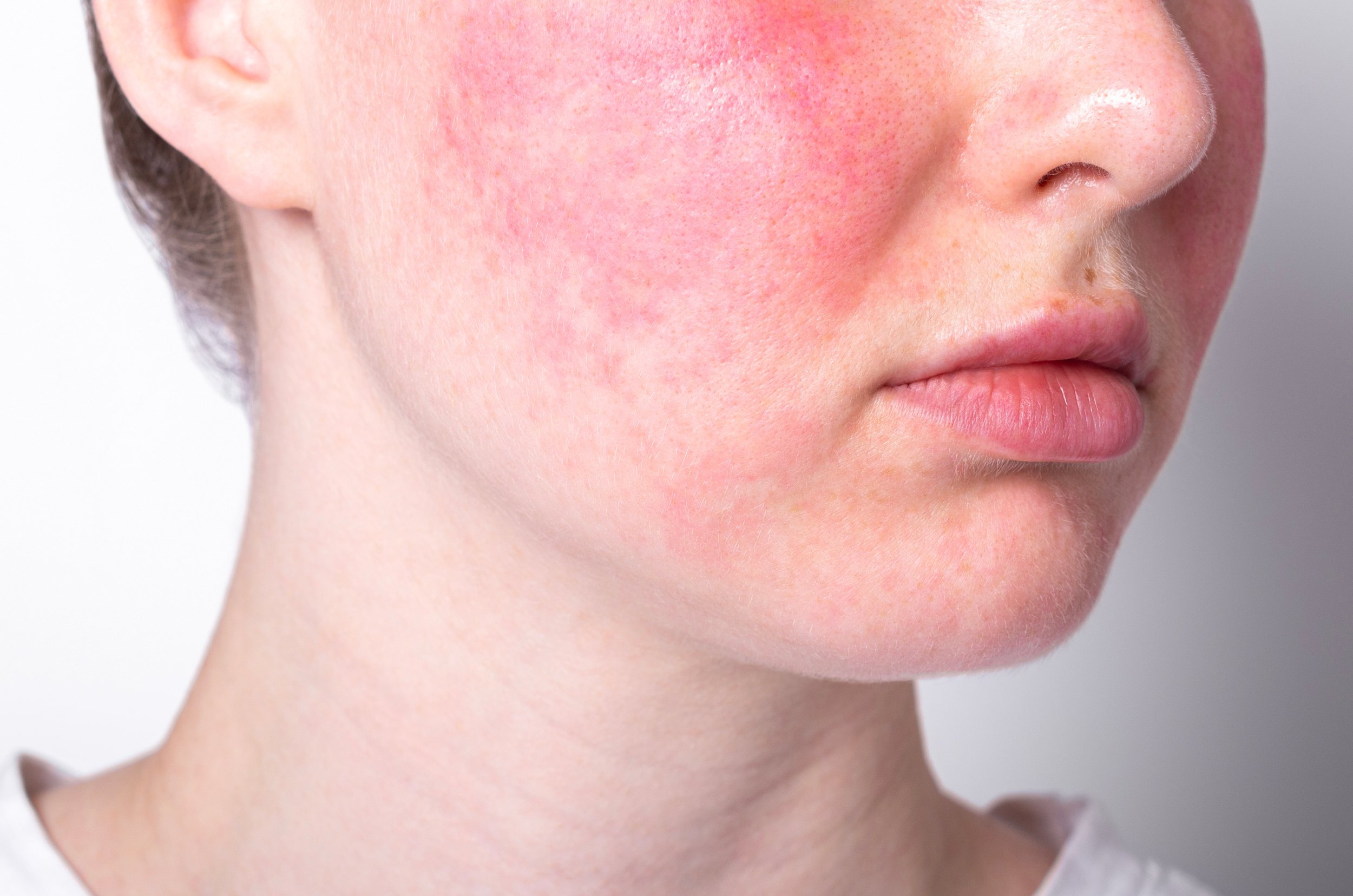Dealing with Rosacea: Treatment Options and Tips for Sensitive Skin in Ooltewah, Cleveland, and Chattanooga
Introduction:
Rosacea is a chronic skin condition that affects millions of people, causing redness, visible blood vessels, and sometimes acne-like breakouts on the face. Managing rosacea can be challenging, especially if you’re unsure about the best treatment options for your sensitive skin. In this blog post, we’ll address common questions about rosacea, explore effective treatments, and provide practical tips for managing sensitive skin. If you’re in Ooltewah, Cleveland, or Chattanooga and struggling with rosacea, Clear Derm™ is here to help you find the right solution.
Rosacea on face
Common Questions About Rosacea
1. How Do I Get Rid of Rosacea ASAP? While there’s no cure for rosacea, certain treatments can help manage flare-ups quickly. Topical medications, such as metronidazole or azelaic acid, are often prescribed to reduce redness and inflammation. For rapid relief, your dermatologist might also recommend laser therapy or intense pulsed light (IPL) treatments, which target visible blood vessels and reduce redness.
2. What is the Main Trigger for Rosacea? Rosacea triggers vary from person to person, but common culprits include sun exposure, stress, hot beverages, spicy foods, caffeine and alcohol. Identifying and avoiding your specific triggers is crucial in managing the condition. At Clear Derm™, we can help you pinpoint these triggers and develop a personalized treatment plan.
3. What is the Number One Treatment for Rosacea? The most effective treatment for rosacea often involves a combination of approaches. Topical treatments like metronidazole, oral antibiotics, and lifestyle changes are typically recommended. For persistent redness and visible blood vessels, laser therapy or IPL might be the best option. Clear Derm™ offers these advanced treatments to patients in Ooltewah, Cleveland, and Chattanooga.
4. Why Did I Suddenly Develop Rosacea? The exact cause of rosacea is unknown, but it’s believed to be a combination of genetic and environmental factors. Some people may develop rosacea suddenly due to changes in their environment, stress levels, or new skincare products. If you’ve noticed sudden symptoms, it’s essential to consult a dermatologist to get a proper diagnosis and treatment plan.
5. What Should I Wash My Face with If I Have Rosacea? For individuals with rosacea, it’s important to use a gentle, non-irritating cleanser. Look for products labeled as “fragrance-free” and “hypoallergenic.” Avoid using exfoliating scrubs or anything with harsh chemicals. At Clear Derm™, we can recommend specific products that are safe for sensitive, rosacea-prone skin.
6. What is the Best Non-Prescription Rosacea Treatment? For those looking for non-prescription options, over-the-counter products containing niacinamide or azelaic acid can be effective in reducing redness and inflammation. Sunscreen is also a must for anyone with rosacea, as sun exposure is a major trigger.
7. What Cream Do Doctors Prescribe for Rosacea? Dermatologists often prescribe creams containing metronidazole, azelaic acid, or ivermectin to manage rosacea symptoms. These medications help reduce redness, swelling, and the number of acne-like breakouts associated with the condition.
8. What Happens if You Ignore Rosacea? Ignoring rosacea can lead to a worsening of symptoms, including increased redness, more visible blood vessels, and potentially permanent skin damage. In severe cases, untreated rosacea can result in rhinophyma, a thickening of the skin on the nose. It’s important to seek treatment early to manage the condition effectively.
Tips for Managing Rosacea
1. Protect Your Skin from the Sun: Sun exposure is a major trigger for rosacea flare-ups. Always apply a broad-spectrum sunscreen with at least SPF 30 before going outside, even on cloudy days. Wear a wide-brimmed hat and seek shade whenever possible.
2. Choose Gentle Skincare Products: Opt for skincare products that are formulated for sensitive skin and are free from alcohol, fragrances, and other irritants. Moisturizers should be hydrating but not greasy, and cleansers should be mild.
3. Manage Stress: Stress can trigger or worsen rosacea symptoms. Incorporate stress-reducing activities into your routine, such as yoga, meditation, or regular exercise, to help keep flare-ups at bay.
4. Avoid Extreme Temperatures: Both hot and cold temperatures can exacerbate rosacea. Avoid hot showers, saunas, and spicy foods, and protect your skin in cold weather by using a gentle moisturizer and wearing a scarf.
5. Keep a Trigger Diary: Tracking your triggers can help you identify patterns and avoid things that worsen your rosacea. Note down what you eat, drink, and your activities, and review them with your dermatologist to refine your management plan.
Conclusion:
Managing rosacea requires a tailored approach that considers your specific triggers, skin type, and lifestyle. Whether you’re dealing with a mild case or more severe symptoms, Clear Derm™ is here to help you find the right treatment plan. Our clinic in Ooltewah, TN, serves patients from Ooltewah, Cleveland, and Chattanooga, providing expert care and the latest in rosacea treatments.
If you’re struggling with rosacea or have noticed changes in your skin, we invite you to schedule an appointment with Dr. Eli Kim and our experienced team. Don’t wait—take the first step towards clearer, healthier skin today.

